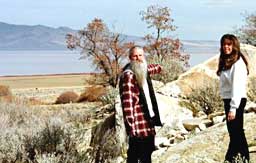  Paul Beach and Kinberly Raymos point toward
the Sierra Army Depot on the other side of
Honey Lake. (Milford, California) Paul Beach and Kinberly Raymos point toward
the Sierra Army Depot on the other side of
Honey Lake. (Milford, California) |
| Volume disposed 20 times greater than that
used in the Gulf War Worry about explosions |
Heading northwest from Reno, Nevada, about
thirty minutes after crossing the border
into California, I arrive in Milford, a tiny
town on Honey Lake. Paul Beach (51), who
I had contacted in advance, and his partner
Kinberly Ramos (46) are waiting in their
jeep by the side of the road.
"The first time you come it's easy to
miss the driveway to our house." Paul
has a long beard and his manner is very friendly.
Milford has a population of 90. Paul was
an investment broker longing for the peace
and quiet of nature before moving here from
San Francisco in 1981. Kinberly has been
living with him for six years.
![]() No peace and quiet
No peace and quiet
After climbing the mountain road for about
a hundred meters, Paul and Kinberly got out
of their car and walked to a high cliff.
They pointed into the distance. "See?
On the other side of the lake, right in front
of us is the Sierra Army Depot. That is what
keeps us from having peace quiet around here.
Recently, we've also learned that they're
disposing of depleted uranium (DU) weapons."
According to Paul, this military facility
takes in old or excess weapons and ammunition,
and every year explodes or burns over 39
thousand tons of it. This has been going
on for over 30 years, but the frequency and
magnitude of the explosions has increased
significantly since 1995, when other bases
around the country were eliminated.
"We are 12 miles away (19.2 kilometers)
and we didn't really care when it was just
a matter of some black smoke. But in October
1995, there was this tremendous explosion.
Our house shook hard, like a big earthquake."
![]() Cracks in the walls
Cracks in the walls
Their house was another two kilometers (1.25
miles) up the mountain. When we arrived,
I saw obvious cracks in the walls. "We've
spent more than $10,000 on repairs. We also
spent three years in court, but the judge
sided with the military," Kinberly reported
with frustration.
A bad day means as many as 28 explosions.
Beginning in 1996, Paul and Kinberly began
videotaping the smoke as it climbed into
the sky. This helped them see that the roiling
mushroom clouds were dispersing in all directions.
"These explosions are spreading contaminants
all around here. There's no doubt about that."
After the court ruling, still doubting the
explanations offered by the military, they
began communicating with an environmental
activist in Reno. In October 1999, the activist
sent them a long fax, copies of documents
by which the Nuclear Regulatory Commission
(NRC) grants permission to dispose of DU
at the Sierra Army Depot.
The expiration date on the oldest of those
documents was September 30, 1981. It stipulated
a maximum of 2,257 tons of DU. In later contracts,
the amount increased to 5,000 tons. The one
in effect until March 31, 1997, allowed 2,520
curies (about 6,500 tons) of radioactivity.
This figure is 20 times the 320 tons that
the American and British troops were said
to have used in the Gulf War.
Paul immediately presented these documents
at a Lassen County Board of Supervisors meeting
held in Susanville. Present at that meeting
were five supervisors, staff of the state
and county environmental protection departments,
and about 50 residents. None knew anything
about such contracts.
![]() High incidence of cancer and other disorders
High incidence of cancer and other disorders
"They were all shocked. Some of them
knew nothing about DU." Rates of cancer
and many other diseases are abnormally high
among the 25,000 residents of Lassen County.
The presence of the Sierra Army Depot was
already a major issue for the residents.
Later, when Paul and others confronted the
military with the contract, their only answer
was, "We don't dispose of it. We store
it, then send it to another facility."
"Given the nature of this facility,
no one believes that."
"Yeah. No one doubts that they're spreading
chemically toxic and radioactive substances
into the lake and all over this area."
Taking turns expressing their distrust of
the military, Paul and Kinberly gazed wistfully
down through a beautiful pine forest toward
the sparkling lake.